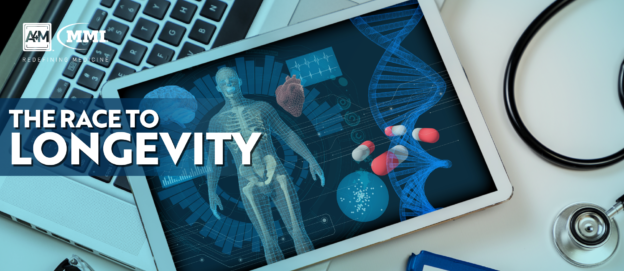A growing body of research demonstrates significant discoveries and advancements in knowledge into potential biomedical strategies for reversing the aging process. Today, researchers continue to study animal and human abilities to regenerate cells, aiming to diminish cognitive decline, immune system weakening, and other adverse effects of the biological aging process. Meanwhile, healthcare and biotech companies race to “find the key” to reversing the aging process, bringing the market valuation of anti-aging medicine to a projected $610 billion by 2025 from current estimates of $110 billion. Investors are pouring millions into start-up companies that focus on anti-aging and regenerative medical research, in hopes of being the first organization to make a breakthrough – bringing a successful solution to aging to the public.
Latest Advancements in Longevity Research
The latest studies have delivered promising results revealing the potential to effectively reverse the aging process for the first time. A small-scale trial based in California and published in Aging Cell recently showed that a cocktail of medications was able to rejuvenate the human epigenetic clock while regenerating the immune system. The trial results found an average decrease of 2.5 years in biological age in each participant – as measured by epigenetic change – as well as improved functioning of the immune system associated with one year of growth hormone supplementation anti-diabetic pharmacologic therapy. In their study, Dr. George Fahy, chief scientific officer of Intervene Immune Los Angeles, and his team were able to deliver the first conclusive evidence of the reversal of biological age in the human body.
Further animal-based studies have revealed advancements in brain cell regeneration, which demonstrate novel methods of returning aged stem cells to a younger state. A team of investigators based at the Wellcome-MRC Cambridge Stem Cell Institute at the University of Cambridge examined the brains of young and old rats, aiming to better understand the impact of age-associated brain stiffening on the function of oligodendrocyte progenitor cells (OPCs). By reversing the aging process in rat brain cells, the trial helps elucidate the role of age-related increasing brain stiffness in brain cell dysfunction. This has vast implications for both the growing understanding of the aging process, as well as the development of much-needed treatments for age-related neurological diseases.
The field of stem cell therapy has also expanded greatly in recent years, with advancements in genome editing, the engineering of pluripotent stem cell-based therapies, neural stem cell cancer therapy, and many more discoveries. Moreover, novel technologies are driving the ability to produce cellular products and regeneration therapies, bringing them closer to patient use. In recent years, research has identified many novel strategies for increasing longevity in the population, including how to: isolate and genetically modify blood stem cells to remove immune cells that can cause adverse reactions during transplantation, reach the next level of targeted gene therapeutics, and advance techniques for DNA methylation editing.
Growing Investment and Funding
These rapid developments in regenerative medicine illustrate the vast potential of anti-aging strategies for reversing biological age, treating and curing disease, and ultimately extending the human lifespan. Once seen as an improbable, distant future, the concept of extending life is steadily becoming a reality. Perhaps one of the most quantifiable factors reveals the impending changes; millions of investment dollars are being directed toward human longevity research across the globe.
Last month, the British biotech start-up Juvenescence – which develops a range of regenerative therapies and technologies – closed a $100m Series B funding round, putting the value of the company at $500m. Hoping to achieve the lofty goal of extending the human lifespan to 150 years, Juvenescence has invested in 15 companies, most of which are based in the United States.
However, Boston-based biotechnology company Life Biosciences has received significant funding as well. Founded in 2016 by scientists David Sinclair and Tristan Edwards, Life Biosciences raised $50m – double its goal – in a Series B financing round in January of this year. With the goal of uncovering an anti-aging breakthrough, the company invests in research into several pathways of age-related decline and a series of companies that carry out their own development programs.
The study of anti-aging and regenerative medicine has only grown in popularity in recent years and shows no signs of slowing down. As revealed by both the rapid developments in longevity research and the financial backing of biotechnology companies, the race to increased longevity may soon deliver groundbreaking anti-aging strategies. Despite millions of dollars and several years of research, the solution to biological aging is yet to be found, however, the many emerging technologies promise to make the aging process itself easier while also attempting to extend the human lifespan to new lengths.

